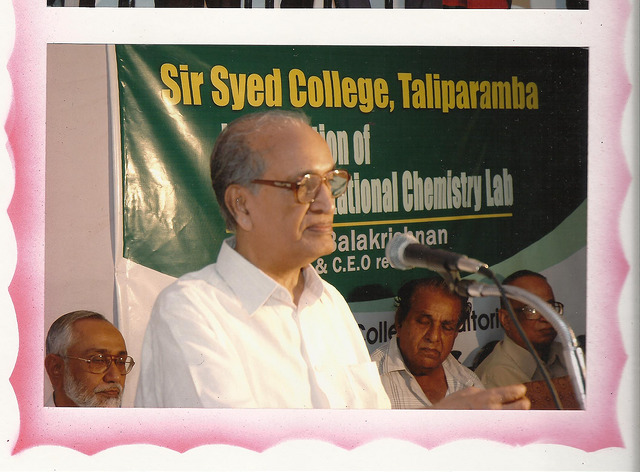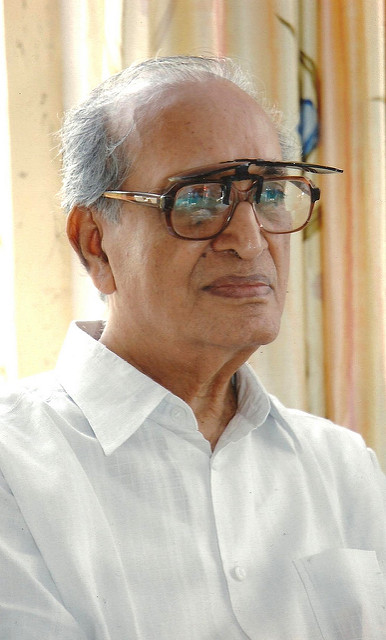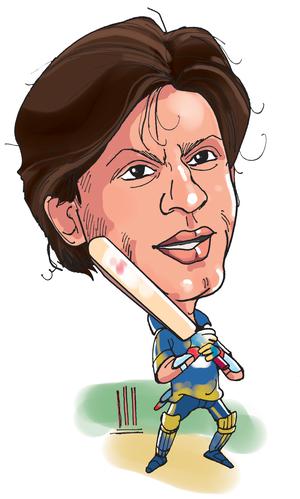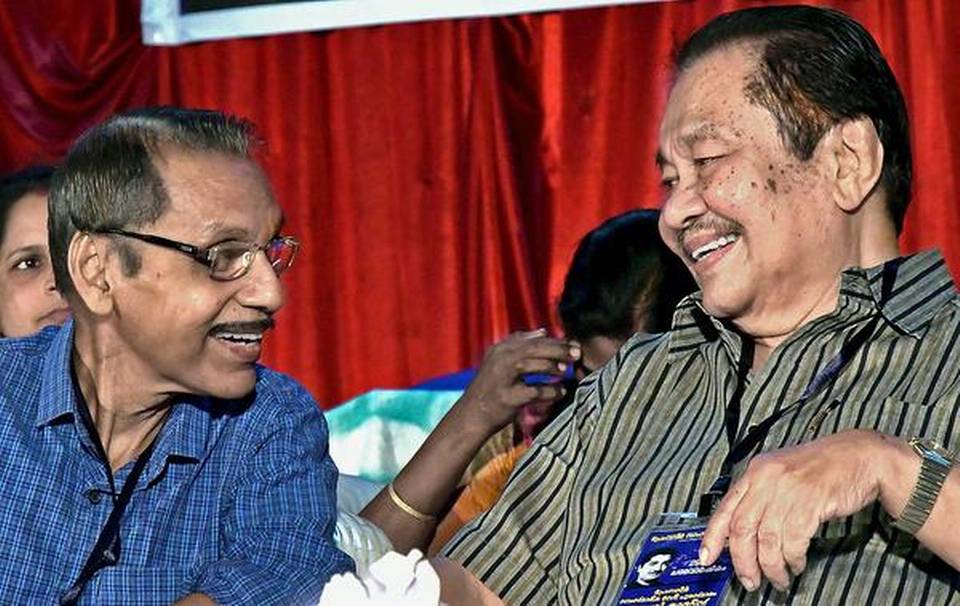Kannur, KERALA / JAMMU & KASHMIR / Chennai, TAMIL NADU :
MUHAMMED NOUSHAD profiles Justice V Khalid, renowned Supreme Court judge and veteran jurist, a man of integrity and knowledge.
Certain human beings mark a place in history with their impeccable professional decorum and striking humility that springs forth from profound knowledge. Even after long years of service at the highest offices of the world’s largest democracy, they remain incorruptible, refusing fame and glitter despite every right to claim significance. Power doesn’t infect their souls, though they have closely witnessed dirty tugs of war in the formidable corridors at capital cities. Justice V Khalid belongs to this rare breed.

Justice V. Khalid
Having learnt of an impressively well-read, extremely sophisticated veteran with enviable experiences at the highest national offices in India, you do not expect to meet a polite, down to earth, self-effacing smiling saint. Justice Khalid has been to the forbidding interiors of Indian politics, but it least affected him, as it appears. He was not only a renowned justice at the Supreme Court of India, but also served Governor to India’s one of the most tumultuous states – Jammu and Kashmir.
Childhood & Education
Vazhakkulangarayil Khalid has his story’s humble beginnings in Kannur city, a few kilometers away from Kannur. He was born on 1 July, 1922 as the fourth child of a lower middle class couple – Mr. CC Marakkar and Ms. Zainaba. They had six children: three girls and three boys. His father was helping his elder brother in the business of coffee husk, coffee and tea at Changanassery.
Arakkal Raja, the then king from the sole Muslim royal family in Kerala history, was his immediate neighbor. Khalid studied in Madrasa Ma’dinul Ulum, an aided school, where he received both religious and modern education. A philanthropist called Koyakkunji, alias Koyikka, had founded the school with the aid of the Arakkal family. Koyikka’s vision and commitment has been instrumental to many people’s education in Kannur. Khalid gratefully remembers: “Koyikka is responsible for what I am. He himself was not educated. But he helped a lot of students to get education. He was very able, powerful and influential.”
When Khalid was 10, his father passed away. Koyikka came to his home, and decided to teach him. It was a sort of adoption; till graduation he was supported by Koyikka. Same was the case for many. He believed in the power of education. He was not rich, but he was very generous.
Obviously, Khalid was a bright student. He learnt Arabic, English, Malayalam, Urdu and a little Persian apart from other subjects at the school. The languages he learnt there would come for great help in his later career. It was 1926-27. Thereafter, he studied in Municipal High School, Kannur, did intermediate at Government Brennen College in Thalassery and went to Presidency College in Madras to do graduation in mathematics.
Stint as Teacher
Sultan Abdurahiman Ali Raja of the then Muslim League was an MLA and a respected Raja. When the British officer, then Director of Public Instruction, Sir Reverend Stathem visited him, the Raja introduced Khalid to the former. Having learnt of the unemployed boy’s educational qualification, the British officer immediately offered a King’s Commission in the army to be a second lieutenant. Khalid’s mother was not happy, however. She started crying as she was worried that her son might be killed in war. She wanted to dissuade him from joining the army. He obeyed his mother and soon found himself a PSC (Public Service Commission) appointed teacher at Malappuram Government High School.
He was 21 years old, then. In his one year stint as a teacher, he befriended two colleagues who would make a lasting influence on him: two brilliant science teachers, Mr. Koya and Mr. Mukundan, with whom Khalid stayed in a lodge. They initiated him to the world of reading, chess and star gazing. Khalid read classics, history, science, everything in their collection, and fell in love with letters. After one year, he went to study law, at Madras Law College thanks to the encouragement of his relative, Mustafah Sahib.
Lawyer, Husband, Judge
Having completed the course in law, he came home and joined the Kannur Munsiff’s Court in 1948. Only 19 advocates were there. Khalid remembers he was lucky to be with “saintly” lawyers like PS Narayana Iyer and later after a year in Thalassery with SS Ramanadha Iyer.
After the practice in Thalassery bar since 1949 to 1964, he moved to the Kerala High Court. It was not part of a well-planned ambitious career goal. This small-town boy had a thirst for knowledge and exposure, and a sincere attitude towards his society. But, that was enough. He was meant for big things. Later, after years of service as a reputed judge, in one of his lectures, he would speak about the decision to shift from Thalassery to the High Court: “it was a jump in to the unknown. Nothing was planned. I cannot boast of any heraldry. Nor do I have any ancient legacy. I just decided to go. I thought I will either sink in the backwaters of Cochin or swim. Sink I did not. I swam, rather successfully”.
In 1949 December, Khalid married Rabiya, daughter of Mr. AC Muhammed, a rich and generous business man in Kolkata, originally from Thalassery. Khalid remembers how his richly brought up wife reconciled herself to the very ordinary and moderate ambience of his home. They have one daughter: Thahira.
In 1969 came the first proposal to elevate Khalid as a Judge in the Kerala High Court. Syed Abdurahiman Bafaqi Tangal, one of the foremost leaders of the Muslim League, was behind this move. Khalid hadn’t even known him personally, nor had he targeted it in near future. When the news of the vacancy broke, Tangal wanted him to meet Justice Hidayatullah, the Chief Justice of the Supreme Court of India. Khalid remembers it was an order, from an irresistibly sincere politician. Khalid was already in Madras for a surgery for his wife, and was least prepared for a formal meeting with a high dignitary in Delhi. But, owing to Tangal’s command, he did go to meet Justice Hidayatullah, borrowing the coat of his friend Prem Nazir, Malayalam film industry’s one of the first super stars. However, the meeting didn’t bring the fruit Tangal had expected. The Justice was of the opinion that Khalid was too young for the designation and can wait.
Khalid waited. He kept practicing as a lawyer and was principled not to approach anyone for the post. Justice TC Raghavan affectionately asked him to be a High Court judge and the dream of many of his well-wishers came true on April 3, 1972. Justice Khalid remained at the office of the High Court till 1983.
Kashmir Calling
There was a growing rift between the Prime Minister Ms. Indira Gandhi and the Jammu and Kashmir Chief Justice Justice Bahauddin. Ms. Indira was looking for a Muslim judge to replace Justice Bahauddin. Since 1981, Justice Khalid kept receiving proposals, in the form of phone calls and letters from VIPs, to be the Chief Justice of J&K. “I was afraid to go to Kashmir, as I was not very sure if I will be welcomed, due to political circumstances. I resisted the offer for two years, despite the continuous insistence of friends like Krishna Iyer,” notes the Justice. Eventually, Dr. PC Alexander, the then private secretary of Ms. Indira came to Kochi on a personal visit and invited him for a friendly dinner. In the end of the dinner, Dr. Alexander told Justice Khalid firmly: “You must leave for Delhi tomorrow.” Justice Potty, the then Acting Chief Justice of the Kerala High Court was surprised. Khalid was left with no options: he had to leave for Delhi the next day and he found all documents ready at the Kerala House. He then flew to Srinagar. “Kashmir was a beautiful experience. The people were so good-natured. I loved the place and the people. However, I soon realised that most of them had strong anti-India feelings. It was all connected with the Centre’s promise to hold plebiscite,” adds Justice Khalid. He would later recall his short stint as the Chief Justice of Jammu and Kashmir, quoting two lines from one of his favourite Urdu poems by Bahadur Shah Zafar:
Umre daraaz maang kar laaye the chaar din
Do aarzu mein kat gaye, do intezaar mein..
(Having sought a long life, I had brought four days.
Two were lost in desire, and two in waiting.)
Soon after the arrival, he met Mr. Farooq Abdullah, the Chief Minister, who was not in good terms with the Centre. The Chief Minister did express his resentment with the Centre in the first meeting itself, though the relationship between the judge and the CM later turned out to be personal, to the extent that the CM’s mother, Sheikh Abdullah’s widow, Noorjahan became very close to him. “She was a very pious lady, and everyone called her as ‘mother’, with veneration”, says Justice Khalid.

Another important person Justice Khalid was to befriend in the valley was none other than the then Governor of the State Mr. BK Nehru. He was an upright and sane statesman. When Mrs Gandhi demanded the Farooq Abdullah ministry to be dismissed – as an eventuality of a long unpleasant political battle between the two – Mr. BK Nehru forthrightly rejected the idea. BK Nehru replied that he could do it only on the floor of the assembly, as per the constitution. Obviously, it infuriated Mrs Gandhi. Mr. BK Nehru, in one of his lecture tours to the US, requested Justice Khalid to “look after the state” and thus Justice Khalid was appointed the Governor of Jammu and Kashmir for 12 days, in 1984 winter.
After the tenure of Mr. BK Nehru, Jagmohan came as the governor. Many of the chroniclers of the Kashmir dispute have rightly registered him as the main culprit who worsened the crisis with gruesome human rights violations. He was very unfriendly to the people of Kashmir. He reportedly commented that he didn’t want the people of Kashmir, but only the land. Justice Khalid remembers the days Jagmohan reached the State. “When he assumed the office, I had to administer the oath of office to him as the Chief Justice. He desired to take oath in Urdu and wanted to know if I could do it. He and his circle expected that I may not be able to speak all those chaste Urdu words, as I am a South Indian. To their surprise, I said yes, and accordingly, the oath was taken in Urdu.” Once, Jagmohan gave a dinner to Fraooq Abdullah and Justice Khalid. In a very friendly ambience, the host was cracking jokes at Pakistani leaders like Ziaul Haq, eating with Mr. Farooq Abdullah and Justice Khalid. It was a total surprise when the very next morning the same Governor had dismissed the Chief Minister. Quite long, Mrs Gandhi had been waiting for this.
As Justice Khalid’s term at the High Court of J&K was about to end, Dr. Alexander called him to offer the chairmanship of the National Minority Commission. He politely declined, telling that he would like to be with the Supreme Court. But, becoming a Chief Justice at the SC required a nod from the Centre, and Mrs Gandhi was not very sympathetic to Justice Khalid as she thought his judgment, along with Justice Potty’s, was responsible for her colleague K. Karunakaran’s resignation as the Chief Minister of Kerala, after the Rajan murder case. However, Dr. Alexander, playing the role of a great well-wisher, kept reminding her about the imminently ending term of Justice Khalid in Kashmir and his interest to come to New Delhi. As soon as Mrs Gandhi gave a silent nod, Dr. Alexander hurried the procedures and Justice Khalid became a Justice at Supreme Court of India without the usual procedural delays. It was 1984. The year Mrs Gandhi was killed. Fate had it that Justice Khalid would sit to hear the plea of the ones who were accused in the assassination of Mrs Gandhi.
Though there was no official relationship between Justice Khalid and Mrs Gandhi, their first meeting was in 1984, as the Supreme Court Judge and the Prime Minister had a chance encounter at the venue of the inauguration of the India Islamic Cultural Centre at New Delhi. Justice Khalid remembers it was late Mr. Hasan Haji of the Calicut-based JDT Islam Orphanage who introduced him to her. In a brief conversation, Justice Khalid told her that he was “in solitary confinement”. “Why?” she asked. “I am staying in a room of Kerala House,” he replied, as no house had been allotted to him. The next day, as per the instructions of the Prime Minister, he was shifted to a beautiful house. Their second and last meeting was at an official dinner, in which Mrs Gandhi complimented Justice Khalid’s wife for her simplicity and demeanour.
After three months of his arrival in Delhi, Khalid got one of the most shocking news he would ever hear: Mrs Gandhi was assassinated by her own body guards. It shook Delhi in umpteen ways. After trial, the three accused were sentenced to capital punishment. A special bench was constituted to hear the case and Justice Khalid was the senior on the bench. The appeal of the accused came. The evidences were strong and it was horrendous crime. But for the second and third accused, Kehar Singh and Balbir Singh, the evidences produced were not sufficient to find them guilty. However, the general talk in the elite clubs in Delhi was that the bench will reject the appeal of the accused, with the blunt harshness it deserves, saying that the conscience of the nation wanted it. It is in classic situations like these, that the judicious discernment of a judge is put to test. The talks in the clubs reached the ears of Justice Khalid, too. Political circles expected the appeal would be rejected outright. Justice Khalid couldn’t just do that. Not because he didn’t love his country or its assassinated Prime Minister. Just for the opposite reason. He loved the country. And firm was his belief that judicious decisions are judicious only when the evidences are gathered indefectibly.
He decided to go through the bundle of papers being submitted. “The records came the previous day; I went through the records at a stretch from 2 pm to 8 pm. Though the murder was shocking and I was mentally prepared to confirm the sentence, I felt on going through the records that there were some grey areas in the evidence which for an impartial Judge, knowing Criminal Law, would like to give an opportunity to hear the counsel for the accused,” he recalls. The decision to issue notice surprised almost everybody in the capital’s high offices. It invited longstanding wrath from many from the ruling class. However, this would bring deep reputation for his nonchalant commitment to the fundamental principles of judicial system. For instance, Adv. Ram Jethmelani, one of the most demanded and most expensive criminal lawyers India has ever seen, would say on the retirement of Justice Khalid, in a farewell party: “Judge, normally I am not sorry when a judge leaves the Supreme Court. But in your case, I feel sorry.” The Judge gives his characteristic smile back to him. After an immaculate service of three years, Justice Khalid returned from New Delhi, at the age of 65.
“I was told by many that I was the first Muslim Judge in the history of Supreme Court who practiced namaz. Of course, there were many reputed Muslim judges before me. However, my regular prayers and attendance in Friday prayers became a talk among the staff and colleagues. Later, many Muslim judges followed my path,” adds Justice Khalid.
Shah Bano Case and Other Muslim Legal Issues
Shah Bano case was, perhaps, the most controversial judgment in the history of India, thanks to politically instigated agitations and provoked reactions from the Muslim community. It simply stated that the divorced Muslim woman has the right to maintenance from her ex-husband. However, the judgment contained a passing reference to the effect that the Qur’an is the word of the Prophet. Muslim politicians like Ebrahim Sulaiman Sait and G.M. Banatwala came to meet him. The congress ministry soon brought a new law, arguably to appease Muslims, as an election was imminent.
There were situations in the judicial career of Justice Khalid where he would worry about the pathetic state of the community, particularly its criminally negligent attitude towards women. He also had issued a verdict saying that even after talaq, a woman has to get maintenance from her ex-husband till she is remarried. About the triple talaq custom, Justice Khalid famously wrote in a verdict: “my judicial conscience is disturbed at this monstrosity of giving three talaqs together. When this monstrosity will end? Will the conscience of the leaders of the community also be disturbed at this?”
As a Judge at the Kerala High Court, in one of the verdicts, he told: “if a question is raised as to whether a Muslim wife can get divorce except through the intervention of court, my answer is an emphatic no.” However, this judgment was subject to criticism from various corners. Justice Khalid was sane and humble enough to realise it was not the way it should have been expressed. “I also later realised that I was not fully correct in what I wrote. I waited for an opportunity till retirement in the Supreme Court, to correct this mistake, but the opportunity did not come. I hope someone will correct it.”
Justice Khalid has always been a firm believer. Whenever there was a case which had a negotiating point with the Islamic Shariah or the Muslim Personal Law, he was very conscious of both the Qur’an and the India legal system. He says he didn’t practically find much contradiction or conflicts between the two. “I have always felt that ours is a remarkable constitution. 85 per cent of those who wrote it were Hindus, still they went for a secular state, instead of declaring it a Hindu Rashtra”, says he. However, Justice Khalid is not in favour of a uniform civil code as he believes it can be made only through a direct conflict with Shariah rules. He adds that a codification of Muslim personal law is absolutely necessary so that the gap between the Mohemmaden law and the Shariah regulations are minimised. “But remember, the codification must be strictly in accordance with the Shariah. For example, our law of divorce is to be completely changed. The Quranic scheme is neglected in its current form. In the case of inheritance laws also, there are contradictions with what Quran says. Our leaders and political parties do not seem to be interested, for political reasons. As the Muslim masses are not educated about this, the parties are frightened about consequences. What they don’t realise is that we don’t have to go against the Shariah, but as per the Shariah. The spiritual exploitation is to blame here,” concludes Justice Khalid.
Justice Khalid has always been unhesitant to correct whenever he found his interpretations on the wrong side of the Shariah’s intended spirit. Honesty to acknowledge one’s mistake, indeed, is a value to be saluted. His love for the Quran is famous among those who know him closely. He took inspiration from the Quran, almost always, and read many translations. Quran literature has been his favourite genre for reading.
For a short term, during his retirement life, he went into Hadith negation. A strict rationalist in him, for a short period, thought that many Hadith are beyond the logic of Islamic values. His Hadith negation was a critical stage in his intellectual growth; he didn’t stay there for long as his honest enquires through various scholarly books from the Muslim world thoroughly convinced him that without Hadith, Islam cannot be fully understood.
After retirement, he has served in different government bodies, including the Chennai based Railway Rates Tribunal. Also, he headed a Police Commission for Tamil Nadu. He served as the chairman of the PM Foundation from its inception in 1988 to 2008.
The best qualifier to denote Justice Khalid’s career would perhaps be “judicious”. He has been fully committed to its virtuous and dignified service of his nation, his people, and the judicial system. He has resisted and refused powerful pressures from both governments and corporate: sometimes mild and covert, sometimes harsh and overt. His political orientation was broadly pro-socialist as many of his judgments, along with his reputed colleagues, stood with the interest of labourers. He belonged to a period when judges were venerated with a degree of fear, by the public and the political class. He hates the custom of judges hanging out and mixing up with public figures and millionaires. With an immaculate record, this man of integrity and knowledge offers a lot of hope. He smiles self-effacingly, sitting in his drawing room, spending time with his books and family. Judiciary’s future lies in the hands of judges with formidable integrity, he reminds us with his life full of accomplishments.
—
M. Noushad is a Kerala-based teacher of journalism.
source: http://www.twocircles.net / TwoCirlcles.net / Home> Articles / by Muhammed Noushad / July 29th, 2012












